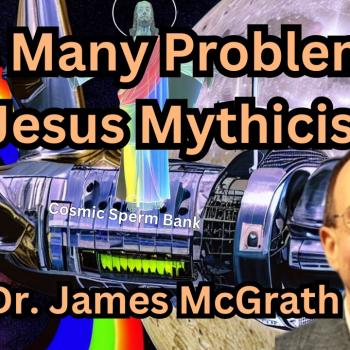The last of my guest posts on Bart Ehrman’s blog about my book What Jesus Learned from Women appeared yesterday. Given that Bart Ehrman and I share an interest in promoting mainstream scholarship over against the misrepresentation of texts and history by conservative Christians and atheist mythicists, I had initially been inclined to start my guest post about Junia on Ehrman’s blog with that as a bridge/intro. If Paul had a relative who was a founding member of the Jesus movement, there from the earliest days, that ought to be a death knell for mythicism, although as with all pseudoscholarship, no evidence ever seems to be enough to keep diehard believers from remaining true to their cause nonetheless.
Since I’m writing on theology and progressive rock at the moment as well, I can’t avoid asking what constitutes a “founding member” of a religion or a band. You can talk about the band Genesis and not feel the need to mention Chris Stewart on drums. That isn’t just because drummers tend to be ignored or disconsidered. (I am reminded of famous joke, often misattributed to John Lennon, as an answer to the question whether Ringo Starr was the best drummer in the world. The reply was that Starr isn’t even the best drummer in the Beatles.) Joanna/Junia was involved from very early and funded the movement. She was a founding sponsor, a patron. While even if Paul merely met Jesus’ brother it would be more than adequate evidence for a historian, Paul also had relatives who were “in Christ” before him, i.e. part of the movement around Jesus in the earliest period. We often have the impression that Paul, as it were, took over on lead vocals in the band Christianity. Yet that is because in our album of the “Greatest Hits of the Early Church” that we call the New Testament, he does so much of the “singing.” Part of the work of historians and other historical scholars is to do justice to the fact that what predominates in literature does not accurately represent the reality of the time that produced that literature. So often, more was written by those whose views were then considered least persuasive, since they had to make their case more strongly and more often. And to conclude the metaphor, all of this is relevant to addressing the mythicist scenario in which Christianity began with a lead singer that only existed in the imagination of the band members.
Chris Hansen has a new article out in the latest issue of the Journal of Greco-Roman Christianity and Judaism, volume 16 (2020). The title is “Lord Raglan’s Hero and Jesus: A Rebuttal to Methodologically Dubious Uses of the Raglan Archetype.” In it he engages mythicist writers such as Richard Carrier who attempt to use the problematic Rank-Raglan scale to mount an even more problematic argument against the historicity of Jesus on that basis. He interacts with my article in Bible and Interpretation, the article that I think has my most alliterative title thus far, “Rankled by Wrangling over Rank-Raglan Rankings: Jesus and the Mythic Hero Archetype.”
Also related to Jesus:
“The one who believes that Jesus is the Son of God” (1 John 5; Easter 6B)
There’s a new book about Pontius Pilate
What is the Source of Jesus’s Authority over Demons? Matthew 12:22-37
Did Paul think Jesus was an Angel?
Did the Apostle Paul influence the Gospel of Mark
Related to What Jesus Learned from Women:
https://aimeebyrd.com/2021/05/05/one-year-after-publishing-recovering-from-biblical-manhood-and-womanhood/
https://www.episcopalcafe.com/two-women/?utm_source=feedly&utm_medium=rss&utm_campaign=two-women
Public Menace: Spectrums of Abuse from the Personal to the Professional
Christopher Frilingos, author of Jesus, Mary, and Joseph: Family Trouble in the Infancy Gospels, wrote an article for The Conversation about how becoming a parent changed the way he reads ancient texts about Jesus and his parents.
See also the piece about Star Wars mothers on the official Star Wars website.


















